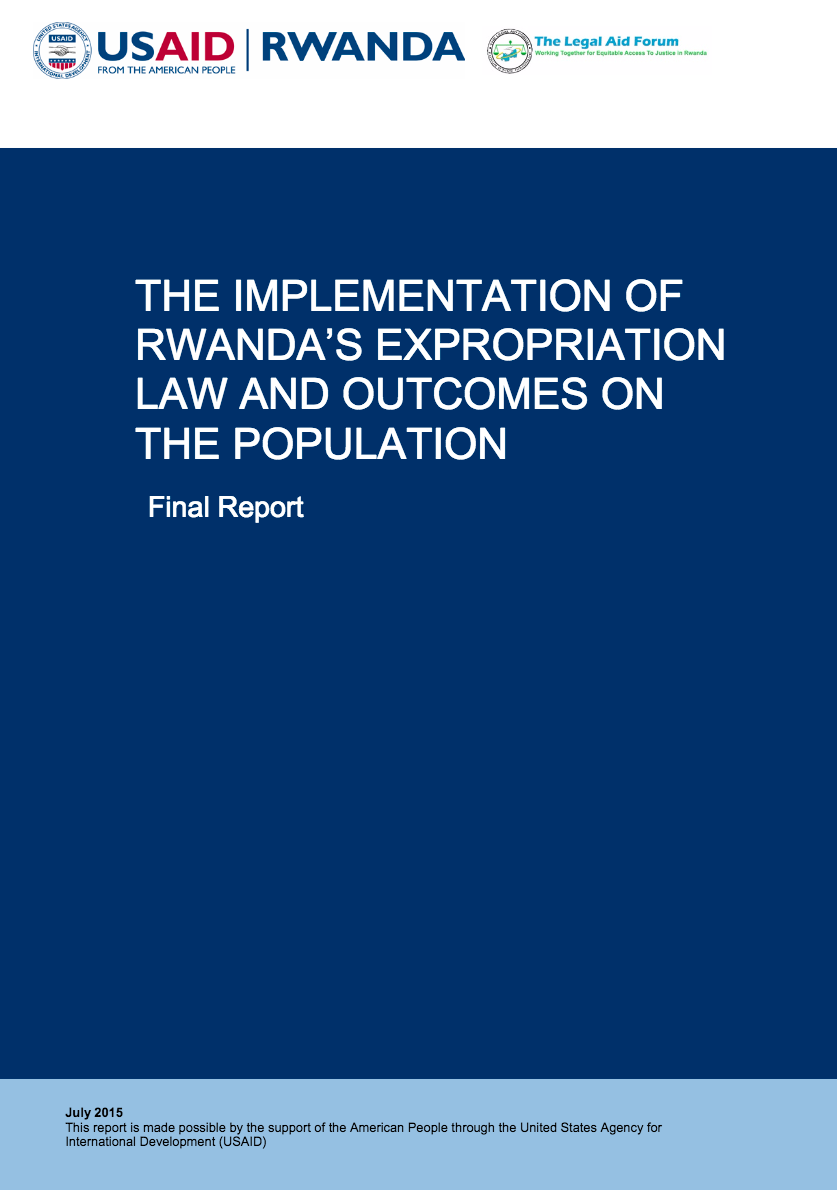Policy Brief: The Implementation of Rwanda’s Expropriation Law and Outcomes on the Population
This Policy Brief summarizes the main findings and recommendations of qualitative and quantative research on implementation and outcomes of the 2007 Expropriation Law in Rwanda. Rwanda is developing at a remarkably rapid pace, and with that development has come a multitude of corresponding changes to the orientation and use of land throughout the country.
Human security and land rights in Cambodia
The report of a project exploring human security and land rights in Cambodia. The project used a human security framework to address two questions: (1) What kind of insecurities do people in areas with land disputes have, and who is most insecure? (2) What provides people with security, and how does land policy relate to other sources of security over land? The study involved more than 400 participants in Kampong Chhnang, Ratanakiri, and Phnom Penh. The study shows that insecurity over land is about wider issues of poverty environment and livelihood insecurity.
2014 brings a new wave of Cambodian land conflicts
A statement by LICADHO detailing the number of people affected by state-involved land conflicts in Cambodia, and providing recommendations to the Cambodian Government. The statement was published to accompany a map showing distribution of the land conflicts. Available in English and Khmer.
Land situation in Cambodia 2013
This report provides background on Cambodia's legal framework, as well as data on the granting of social land concessions, reclassification of land, the land titling program, and land disputes. Dispute resolution mechanisms are also discussed.
VOICE FROM THE FARM - PAPER OF ADVICE FOR SOLVING FARM LAND PROBLEMS
Synopsis of the Paper:
"It is most fundamental to be able to hear voices of farmers as they are in resolving farm land
problems which pose the greatest challenge to Myanmar. Therefore, it is expected that the
"Voice From The Farm" paper will be supportive to a certain extent. This paper was compiled
based on cases that reached the office of 88 Generation Peace and Open Society from
respective region and reinforced with discussions resulting from the VOICE OF
FARMERprogramme which collects and organizes farmers' voices as well as with observations
Toungoo Situation Update: Thandaunggyi Township, April to June 2014
This Situation Update describes events occurring in Thandaunggyi Township, Toungoo District during the period between April and June 2014, including land confiscation and access to education, healthcare and livelihoods: The Burma/Myanmar government provided 1,000 kyat (US $0.97) in A--- village for each student; however the teacher did not pay out the money to the students, saying that she had paid out the money for the cost of transporting school books...There are some mid-wives and medics provided by the Burma/Myanmar government who visit villagers in Maung Nwe Gyi village tract, Kon Tain
Toungoo Situation Update: Thandaunggyi Township, July 2014
This Situation Update describes events occurring in Thandaunggyi Township, Toungoo District in July 2014, including livelihood problems due to land confiscation:
In 2014, Tatmadaw Light Infantry Battalion (LIB) #603 confiscated over 200 acres of villagers’ land without providing any compensation...
The villagers requested permission to collect their crops from LIB #603, however they were denied access to their fields. Instead, LIB #603 allowed local female police officers to collect the crops for themselves...
Hpapun Situation Update: Bu Tho Township, February to June 2014
This Situation Update describes events occurring in Bu Tho Township, Hpapun District from February to June 2014, including land confiscation, extortion, violent abuse and updates on economic development projects and access to education: Tatmadaw Light Infantry Battalion (LIB) #434 confiscated villagers’ farm lands in Meh Ka Law village tract.
The Right To Fair Compensation And Transparency in Land Acquisition, Rehabilitation and Resettlement (Amendment) Ordinance
This legislation concerns expropriation and aims to bring transparency to the process.
Gender equality and land administration
Land, and in particular agricultural land, is central to livelhoods in rural Zambia. Zambia is characterised by a dual legal system of customary and statutory law and by dual land tenure, with state land and customary land. A first wave of socialist-oriented reforms took place after independence in 1964, which abolished previously existing freehold land in favour of leasehold. Subsequent changes in government policies under the influence of structural adjustment programmes and a new government in 1991 paved the way for a market-driven land reform.
Working Together for a Better Kachin Landscape (Sound)
Forestry Water Management, Landscape Approach and Land Management in Kachin State, northern Myanmar.





